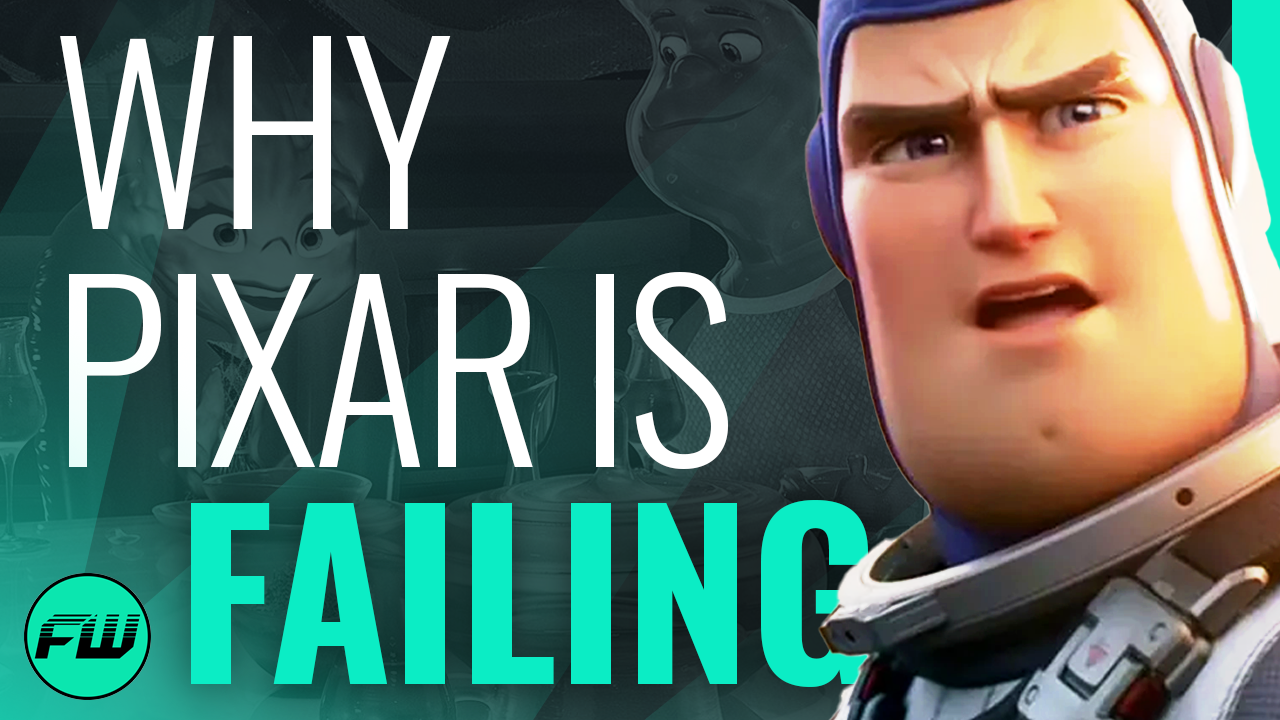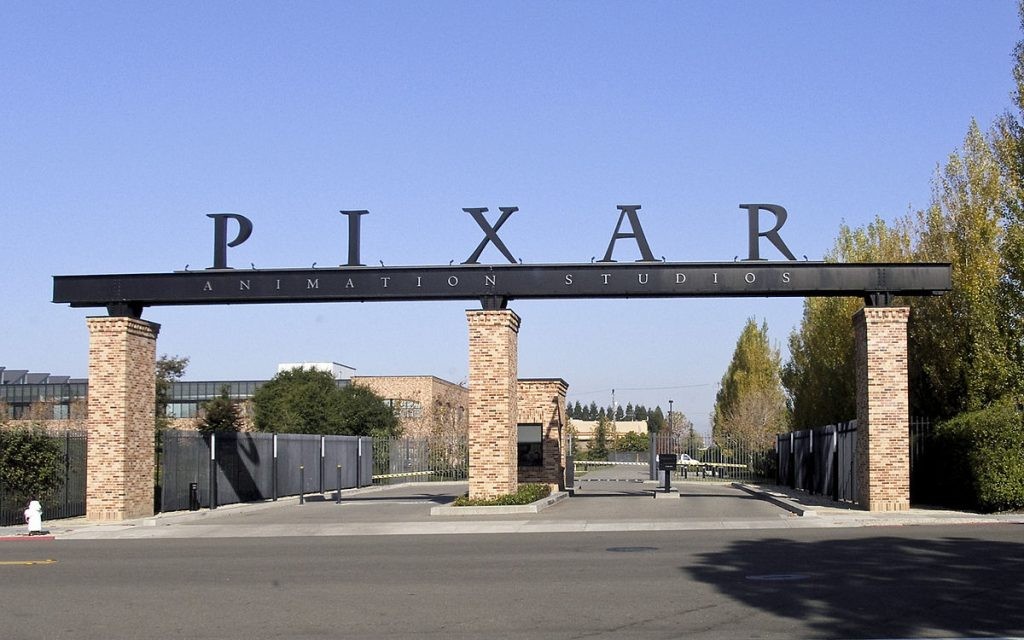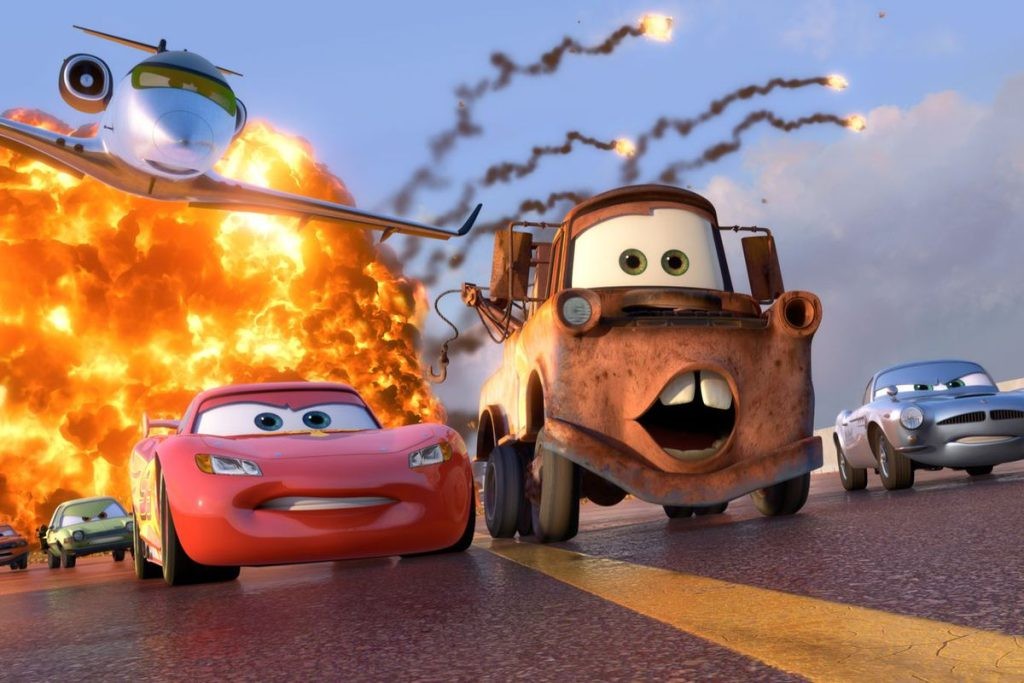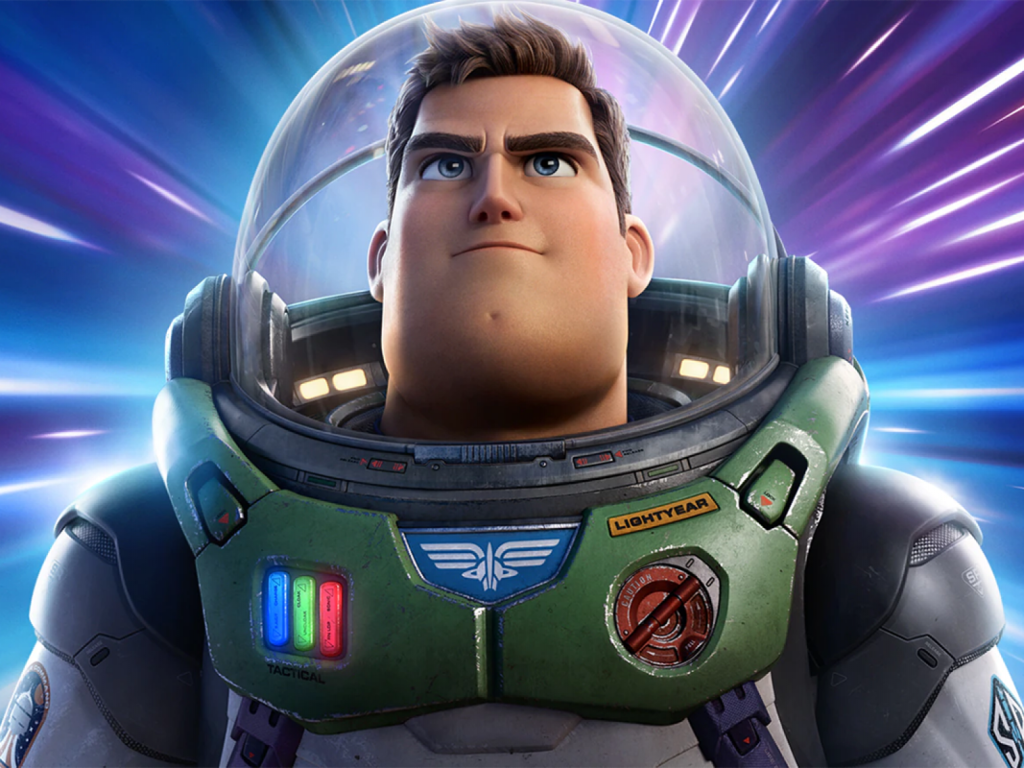In this FandomWire Video Essay, we explore why Pixar is failing.
Check out the video below:
Subscribe & hit the Notification Bell so you never miss a video!
Pixar Is Starting To Fail
This… is failing. If you ask anyone to name their top 5 animated movies, chances are at least one Pixar film would be on that list — if not more. The studio, a subsidiary of Disney, has produced some of the biggest animated franchises in history, including Toy Story, Cars, and The Incredibles.
At one point, Pixar was the little engine that could of the animation world. The studio’s first film, the massively popular and now-classic Toy Story, almost didn’t make it to audiences because of a history of production troubles. Going over budget and poor test screenings almost had the film canned at several points during the production process. However, we all know that the filmmakers figured it out — and amazingly so — creating what is now hailed as one of the greatest animated films of all time. The rest is history. Pixar would become one of the biggest animation studios of all time.
Even though the studio has still produced several of the biggest animated movies of all time, it has struggled in the past few years to release a bonafide hit. Universal’s Illumination — the studio behind such franchises as Despicable Me, Sing, and now The Super Mario Bros. Movie — has seemingly stolen Pixar’s spot as the most reliable animation studio. So what happened to bring Disney’s golden goose to this point of desperation?
Perhaps the earliest point one could identify as the start of Pixar’s downfall is the release of Cars 2. The first Cars film was not among the most beloved Pixar movies by any means, but financially successful. However, Cars 2 is the first Pixar movie to get genuinely negative reviews. If you ask most people what their least favorite Pixar movie is, a majority would tell you it’s Cars 2.
Still, despite the fact that Cars 2 was almost universally hated, it ended up making more money at the global box office than its predecessor. After all, a globe-trotting spy thriller is much more marketable in international markets than the slice of Americana that was the first film. Still, Cars 2 showed that even one of the biggest animation studios in the world wasn’t perfect.
After a string of more hits — Brave, Monsters University, and Inside Out — came another blemish on Pixar’s record: The Good Dinosaur. Audiences simply didn’t connect with the film as well as they did most other Pixar flicks. Still, their films managed to be mostly successful after that, with the exception of Cars 3, which didn’t have the same franchise goodwill as some other films, like Incredibles 2 or Toy Story 4.
Onward can be cut a bit of slack because it was released only a few weeks before… well… the entire world shut down due to the COVID-19 pandemic. Frankly, we don’t know how well the film might have done if it were released in normal circumstances and received a full theatrical run.
What we do know is that the COVID-19 pandemic would have a massive effect on the box office outlook of Pixar’s films, which has yet to be repaired. In a decision made to bolster the subscribers to their streaming platform, Disney decided to take several of their movies, which were once destined to be released in theaters, and release them directly to streaming on Disney+.
The first Pixar film Disney decided to pivot to becoming a streaming exclusive release was Soul. It’s unfortunate that this is the first film the studio decided not to give a theatrical release, as it is also one of the studio’s best-reviewed in decades. It boasts a smart concept, beautiful animation, and a Black lead — making it a welcome stride for diversity in the Pixar catalog.
Next to be released straight to Disney+ was Luca. Although not the critical darling that was Soul, Luca still had its fair share of fans who loved the adorable Italian seaside coming-of-age tale. To boot, the film had some gorgeous visuals optimized for IMAX theaters, but the biggest screen someone could ever see the film on was their living room television.
Finally, Disney chose to release Turning Red, directed by Domee Shi — the filmmaker behind the Oscar-winning Pixar short Bao. At this point, it became clear that Disney wasn’t concerned with releasing films theatrically that were even the least bit uncertain with their box office. Thankfully, this approach would soon end, but in many cases — just see 2023’s Haunted Mansion — it feels like the theatrical window is little more than a teaser for the film’s eventual Disney+ streaming date.
Over time, audiences grew accustomed to seeing these films at home — even if they were great. Thus, when Disney finally decided to start releasing Pixar movies in theaters again, and the element of quality wasn’t there, audiences simply didn’t turn out in the numbers they once did.
The biggest sign of trouble yet for the once-dominant animation studio was the release of Lightyear in 2022. Billed as an origin story for one of the company’s fan-favorite characters — Toy Story hero Buzz Lightyear — the film starred Chris Evans as the space ranger in a sci-fi adventure. It was Pixar’s first major theatrical release after the pandemic, as their previous three movies went straight to streaming, and yet audiences almost entirely rejected it.
Lightyear made a mere $118 million at the box office in the US, and a total of $226 million worldwide. That is a sliver of what one would expect from one of the most popular franchises in the studio’s history. Even Cars 3 made more money, and that was the conclusion of the studio’s trilogy that had the most lukewarm response.
This leaves one to ask… what went wrong with Lightyear? Why was a movie that should have been an absolute cash grab for the studio instead one of its biggest failures? Well, the truth is that it was likely due to no one factor. Some would argue that recasting Chris Evans in the role of original voice actor Tim Allen destroyed the nostalgia factor that could have made it successful. Others will tell you that Lightyear looked like such a blatant cash grab that audiences rejected it entirely.
Then, we come to the interesting case of this year’s Elemental. The film, an animated romance between two star-crossed lovers — one made of fire and one made of water — was met with much more of a lukewarm reception than most Pixar films (both critically and at the box office). In wondering what went wrong with Elemental, people have pointed to a few potential causes.
Some have made the argument that Elemental was not able to reach the same levels of success as previous Pixar movies because it is derivative of other, better films. When the first trailer for the film was released, it was understandably met with complaints that it looked too much like Zootopia. Although this is arguably an oversimplification of the final product, the marketing did the film absolutely no favors.
However, it seems like this is indicative of the bigger issue that Pixar movies are simply no longer the “event cinema” they once used to be. There was a time when audiences — both families and adults — eagerly waited for their chance to see the next Pixar outing on the big screen. Now that they have grown accustomed to seeing these movies on Disney+, audiences are willing to wait the few months it takes to watch the movie on streaming, instead of trekking out to their local multiplexes.
Indeed, this issue has even wider implications than just Pixar. The argument has been made that — apart from Spider-Man: Across the Spider-Verse and The Super Mario Bros. Movie — animated movies have recently struggled at the box office in general. Even once-reliable companies like Dreamworks have been releasing films that are sputtering at the box office. Ultimately, families have become so accustomed to seeing movies at home that it takes a lot for them to go out. Even with the rise of PVOD, it’s cheaper for families to rent a movie for $19.99 at home than to go out and buy tickets for every member of the family.
By today’s standards, Elemental is a moderate success for an animated movie because it managed to leg it out to over $150 million at the box office. Yet, this is still a measly sum compared to what Pixar movies used to make at the box office. And Disney committed to the theatrical release for this one, giving it a full two months in theaters before releasing it for at-home viewing. It shows that if you give families no other choice than seeing them in theaters, they will eventually go out to see the movie — even if not on opening weekend.
Thus, many fans have wondered what Pixar can do to get itself back on track — or if there is even a way for them to salvage the studio. Committing to the prolonged theatrical period for Elemental is a great start, as it shows that Pixar is trying to bring it back to the days when its movies were “must-see” events in theaters. And while Elemental did not screen in IMAX or most premium large format screens, it seems the studio’s next few films will have that advantage, making them feel like true “big screen” experiences.
Pixar is also taking the wise step of investing in the talent that created some of their most beloved films. While Elemental was directed by pre-existing Pixar talent in Peter Sohn, his previous film, The Good Dinosaur, was not particularly well-received. On the other hand, Pixar’s next film, Elio, is directed by Adrian Molina — one of the filmmakers behind the almost universally well-received Coco.
At the same time, it seems like the marketing for Elio is much better than that of Elemental. One of the biggest mistakes in Elemental’s marketing was that it focused more on the concept than the actual story, which earned it those unfortunate comparisons it was never able to grow beyond. On the other hand, the first trailer for Elio — released several months before the film’s 2024 release — does a much better job of communicating the film’s story and what makes it unique.
The studio’s other 2024 release is a sequel to one of its most beloved and financially successful films of all time: Inside Out. Although IP doesn’t necessarily mean everything — Lightyear was one of the studio’s biggest bombs after all — it seems like they have this one in the bag if they can make it into the “event cinema” that it deserves to be.
What do you think? Will Pixar be able to regain their position as the biggest and most reliable studio in animation? Be sure to let us know in the comments below, and as always, don’t forget to like and subscribe. Until next time!
Follow us for more entertainment coverage on Facebook, Twitter, Instagram, and YouTube.




